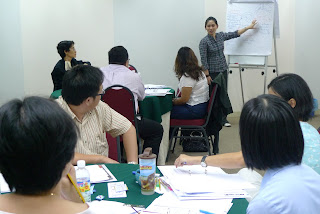




" Be always sure you are right, then go ahead"
David Crockett.
How does one figure out what is right? Simple enough -as a group of lecturers during a Teacher Education training workshop in Kota Kinabalu discovered when they used the SWOT Analysis as a tool in the decision making process.
During the case study discussion, Vivien, Ashley, Helen, and Muada listed out the strengths and weakness, or what is also known as internal factors, of the case study subject. Next, the other group members Tsen Lip Sheng, Yap Sau Lan and Jacqueline analysed the external variables, namely the threats and opportunities, in the case study. After a detailed discussion on these issues, they were confident with the decision they finally arrived at. Using the SWOT Analysis can help one seive out the unimportant issues, thus making it easier to focus on the relevant matters before arriving at a well considered decision.
During the forum session Yap Su Teng, Noirom, Simon Hii Chui Yung and Ellis shared their views and related some of their experiences with regards to the importance of listening skills in effective communication. They concluded that emphatetic listening in interpersonal communication will help the listener understand the feelings and views of the speaker. The other lecturers elaborated that this can also be applied in their interaction with the students.





